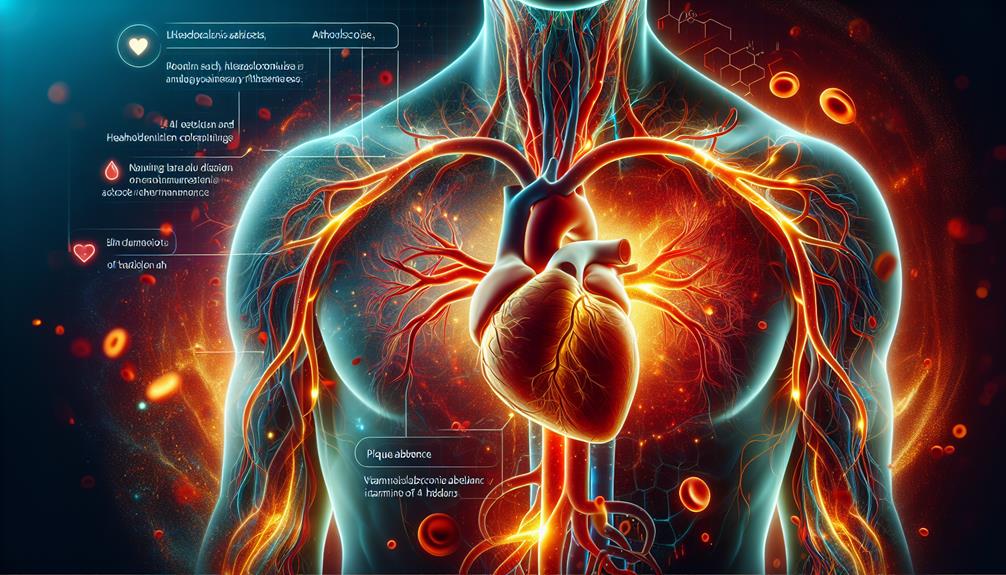







Incorporate niacin (Vitamin B3) into your routine to boost cardiovascular health. Niacin decreases LDL cholesterol and raises HDL levels. It curbs plaque formation in arteries, cutting down atherosclerosis risk. Enhance blood circulation with niacin, widening arteries and promoting healthy flow. Support your heart muscle with niacin's anti-inflammatory properties and energy production. Manage blood pressure and heart inflammation by adding niacin. For an in-depth understanding of how niacin benefits cardiovascular health, explore the detailed insights provided.
Key Takeaways
- Niacin lowers LDL cholesterol and raises HDL
- Niacin reduces atherosclerosis risk and prevents plaque buildup
- Niacin improves blood circulation and widens arteries
- Niacin supports heart muscle function and energy production
- Niacin helps manage blood pressure and has anti-inflammatory effects on the heart
Niacins Role in Cholesterol Management
Niacin actively participates in managing cholesterol levels by effectively lowering LDL (bad) cholesterol and triglycerides while simultaneously increasing HDL (good) cholesterol. Niacin's mechanism involves inhibiting the liver's production of VLDL cholesterol particles, which are precursors to LDL cholesterol, thereby reducing the overall LDL cholesterol levels in the bloodstream. Additionally, niacin has been shown in clinical trials to increase the activity of lipoprotein lipase, an enzyme responsible for breaking down triglycerides, leading to a decrease in triglyceride levels.
In a study published in the Journal of Clinical Lipidology, researchers found that niacin supplementation notably increased HDL cholesterol levels by up to 35% while decreasing LDL cholesterol levels by 25%. These results highlight the efficacy of niacin in improving the overall lipid profile and reducing the risk of cardiovascular diseases. Clinical trials have consistently demonstrated niacin's ability to modulate cholesterol levels, making it a valuable tool in the management of dyslipidemia.
Lowering LDL and Raising HDL Levels
When focusing on managing cholesterol levels for ideal cardiovascular health, the key lies in effectively lowering LDL and raising HDL levels through specific mechanisms. Niacin, also known as Vitamin B3, plays an essential role in achieving this balance and supporting cardiovascular health. Niacin benefits cardiovascular support by lowering LDL cholesterol levels, commonly known as the 'bad' cholesterol, which can lead to plaque buildup in the arteries if elevated. Additionally, niacin has been shown to increase HDL cholesterol levels, often referred to as the 'good' cholesterol, which aids in removing LDL cholesterol from the bloodstream and reducing the risk of heart disease.
Studies have demonstrated that niacin can notably reduce LDL cholesterol levels by inhibiting its production in the liver. Simultaneously, niacin can raise HDL cholesterol levels by promoting its synthesis and inhibiting its breakdown. By effectively lowering LDL and raising HDL levels, niacin contributes to a healthier lipid profile, reducing the risk of cardiovascular events and supporting overall heart health.
Reducing Atherosclerosis Risk

To lessen the risk of atherosclerosis, a condition marked by the accumulation of plaque in the arteries, a holistic approach to cardiovascular health is essential. Atherosclerosis prevention involves implementing dietary recommendations that include a balanced diet rich in fruits, vegetables, whole grains, lean proteins, and healthy fats while limiting saturated fats, trans fats, cholesterol, and refined sugars. Clinical studies have shown that niacin supplementation, also known as vitamin B3, can play a significant role in reducing atherosclerosis risk. Niacin has been found to raise levels of high-density lipoprotein (HDL) cholesterol, often referred to as 'good' cholesterol, while lowering levels of low-density lipoprotein (LDL) cholesterol, or 'bad' cholesterol. By positively impacting cholesterol levels, niacin can help prevent the buildup of plaque in the arteries, reducing the likelihood of atherosclerosis development. It is important to consult with a healthcare provider before starting any supplementation to determine the appropriate dosage and make sure it is safe and beneficial for individual cardiovascular health.
Improving Blood Circulation
Improving blood circulation is essential for maintaining excellent cardiovascular function and overall health. Circulatory health refers to the efficiency of blood flow through the body's vessels, delivering oxygen and nutrients to tissues while removing waste products. Niacin, also known as vitamin B3, plays a vital role in enhancing vascular function. By promoting the production of nitric oxide, a compound that relaxes blood vessels, niacin helps widen arteries and improve blood flow. This vasodilation can lead to reduced blood pressure and enhanced circulation, benefiting various organs and tissues.
Niacin also aids in increasing high-density lipoprotein (HDL) cholesterol levels, which are essential for removing low-density lipoprotein (LDL) cholesterol, the 'bad' cholesterol, from the bloodstream. By balancing cholesterol levels, niacin supports healthy blood vessels and reduces the risk of atherosclerosis, a condition characterized by plaque buildup in the arteries.
Supporting Heart Muscle Function

Enhancing heart muscle function is essential for ideal cardiovascular health, and niacin's role in this aspect is significant. Niacin, also known as vitamin B3, plays a vital role in supporting heart health by aiding in the conversion of carbohydrates into energy, which is necessary for the proper functioning of the heart muscle. This vitamin is involved in the production of adenosine triphosphate (ATP), the main energy currency of cells, including those in the heart.
Moreover, niacin has been shown to help maintain healthy cholesterol levels, which is crucial for cardiovascular well-being. By positively influencing cholesterol levels, niacin indirectly supports heart muscle function by reducing the risk of atherosclerosis and plaque buildup in the arteries, which can lead to heart disease.
In addition to its role in cholesterol management, niacin possesses anti-inflammatory properties that can further contribute to heart health by reducing inflammation in the cardiovascular system, thereby supporting overall muscle function. Ensuring adequate intake of niacin through diet or supplementation can be beneficial for maintaining ideal heart muscle support and function.
Managing Blood Pressure Levels
Supporting healthy blood pressure levels is essential for overall cardiovascular well-being, and niacin's role in this aspect is remarkable. Niacin, also known as vitamin B3, can positively impact blood pressure regulation. Dietary sources rich in niacin include poultry, fish, nuts, and whole grains. Incorporating these foods into your diet can contribute to maintaining ideal blood pressure levels. Additionally, supplement options are available for individuals who may need higher doses of niacin. Niacin supplements, when taken as directed, can assist in managing blood pressure.
Research suggests that niacin helps dilate blood vessels, which in turn can lead to improved blood flow and potentially lower blood pressure. By promoting vasodilation, niacin supports the heart in pumping blood more effectively throughout the body, reducing strain on the cardiovascular system. When considering ways to manage blood pressure, incorporating niacin-rich foods and discussing supplement options with your healthcare provider can be valuable steps towards supporting your cardiovascular health.
Anti-Inflammatory Effects on the Heart

Niacin's impact on cardiovascular health extends to its ability to modulate inflammatory responses within the heart, playing a pivotal role in maintaining excellent cardiac function. Heart inflammation is a significant risk factor for heart disease, as it can lead to atherosclerosis and other cardiovascular complications. Niacin, also known as vitamin B3, has shown promising anti-inflammatory effects on the heart. By reducing inflammation, niacin helps in preventing damage to the heart muscle and blood vessels, promoting overall heart health.
Studies have demonstrated that niacin can decrease the levels of inflammatory markers in the body, such as C-reactive protein (CRP) and interleukins, which are associated with heart inflammation. These anti-inflammatory properties of niacin contribute to its benefits for heart health. By reducing inflammation in the heart, niacin helps in maintaining proper cardiac function and reducing the risk of cardiovascular diseases. Incorporating niacin into your diet or as a supplement may help in managing heart inflammation and preserving the health of your heart.
Enhancing Overall Cardiovascular Health
How can incorporating niacin into your daily regimen positively impact your overall cardiovascular health? Niacin, also known as vitamin B3, plays an essential role in maintaining a healthy cardiovascular system. One way niacin enhances cardiovascular health is by helping to lower levels of LDL (bad) cholesterol and triglycerides while increasing HDL (good) cholesterol, which can reduce the risk of heart disease.
Dietary sources of niacin include poultry, fish, nuts, and whole grains. However, for therapeutic benefits related to cardiovascular health, higher doses are often needed, which may require supplementation under medical supervision. The recommended daily intake of niacin varies depending on age, gender, and overall health status.
Niacin has been shown to support overall cardiovascular health by promoting healthy blood flow, reducing inflammation, and enhancing the function of the endothelium, the inner lining of blood vessels. By incorporating niacin into your daily routine through a balanced diet and possibly supplementation as advised by a healthcare provider, you can potentially improve your cardiovascular health and reduce the risk of heart-related issues.




